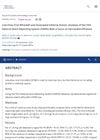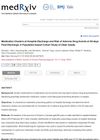Search
for
Sort by
Research
30-60 / 1000+ resultsresearch Suicidality and Psychological Adverse Events in Patients Treated with Finasteride

research Side Effects and Adverse Events After Treatment With Teprotumumab for Thyroid Eye Disease: A Retrospective Observational Case Series
Teprotumumab for thyroid eye disease commonly causes fatigue, brittle nails, dry eyes, hair loss, muscle spasms, and dry mouth, with rare serious events like blood clots.

research Mechanisms of Cutaneous Adverse Events During Targeted Cancer Therapy
Targeted cancer therapies can cause skin side effects, but activating SOS in the skin may help reduce them.

research Comparative Efficacy and Adverse Clinical Events of Methotrexate Versus Azathioprine with Steroid Mini Pulse Therapy in the Management of Moderate to Severe Alopecia Areata: A Tertiary Centre Based Interventional Study
Methotrexate with steroids is slightly more effective than azathioprine with steroids for treating severe alopecia areata.
research Correction to: An Evaluation of the Federal Adverse Events Reporting System Data on Adverse Effects of 5-Alpha Reductase Inhibitors
The correction states that the label change for Finasteride was in 2012, leading to more reports of side effects from non-healthcare people.

research Reporting on Adverse Clinical Events
The FDA warned about safety issues with remdesivir and tofacitinib, finasteride is linked to suicidality, potent topical corticosteroids increase osteoporosis risk, henna can cause hemolysis in G6PD deficiency, chemotherapeutic agents can cause adverse reactions, drug interactions are common in cancer patients, ketamine can reduce at-risk drinking, high dose of anticholinergics increases dementia risk in Parkinson's patients, and prenatal exposure to second-generation antipsychotics increases pregnancy complications.

research Reporting on Adverse Clinical Events
Different medications can cause serious side effects in some people.

research Hair and Nail Adverse Events During Treatment with Targeted Therapies for Metastatic Melanoma
People with certain allergic conditions or higher white blood cell counts have more severe hair loss, and treating hair and nail side effects early in melanoma therapy can improve quality of life.

research Reporting on Adverse Clinical Events
Some medications and supplements can cause serious side effects, including hair loss, heart rhythm problems, liver injury, and other health issues.

research Reporting on Adverse Clinical Events
Monitoring for adverse effects in clinical treatments is crucial.

research Reporting on Adverse Clinical Events
Certain medications can reduce mortality risk in COPD patients, but others can increase risks of cardiovascular issues, postoperative delirium, and other adverse effects.

research Finasteride: Suicidality or Psychological Adverse Events
Finasteride use linked to increased suicidality in patients under 45.

research Differences in Reproductive Toxicology Between Alopecia Drugs: An Analysis on Adverse Events Among Female and Male Cases
Finasteride has a higher risk of reproductive side effects than minoxidil.
research Epidermal Growth Factor Receptor Inhibitors: A Review of Cutaneous Adverse Events and Management
Skin side effects from cancer drugs targeting EGFR can affect treatment adherence but can be managed with antibiotics like tetracycline.

research A Prospective Study of Cutaneous Adverse Events Induced by Low-Dose Alpha-Interferon Treatment for Malignant Melanoma
Most patients treated with low-dose alpha-interferon for malignant melanoma experienced skin side effects, with hair loss being the most frequent.

research Investigation of Suicidality and Psychological Adverse Events in Patients Treated With Finasteride
Finasteride may cause suicidal thoughts and mental side effects, especially in young people with hair loss.

research The Management of EGFR Inhibitor Adverse Events: A Case Series and Treatment Paradigm
Skin side effects from EGFR inhibitor cancer treatment can be managed effectively, often without stopping the medication.

research The Incidence and Management of Cutaneous Adverse Events of the Epidermal Growth Factor Receptor Inhibitors
EGFR inhibitors can cause various skin issues during cancer treatment, and managing these is important for patient care.

research Low-Dose Oral Minoxidil and Associated Adverse Events: Analyses of the FDA Adverse Event Reporting System With a Focus on Pericardial Effusions
Low-dose oral minoxidil can cause serious side effects like heart issues, so use the lowest effective dose.

research Comments Concerning the Real Risk of Sexual Adverse Events Secondary to the Use of 5-Alpha-Reductase Inhibitors
The document concludes that the risk of sexual side effects from 5-alpha-reductase inhibitors is low and often temporary, but more research is needed on potential permanent effects.

research Cyclin-Dependent Kinase 4/6 Inhibitors and Dermatologic Adverse Events: Results from the EADV Task Force Dermatology for Cancer Patients International Study
Skin side effects from CDK4/6 inhibitors in breast cancer patients are generally mild and treatable, allowing most patients to continue treatment.

research Drug-Induced Hair Loss: Analysis of the Food and Drug Administration’s Adverse Events Reporting System Database
Certain medications, including some immune drugs, contraceptives, and hair loss treatments, are often linked to hair loss.

research Medication Clusters at Hospital Discharge and Risk of Adverse Drug Events at 30-Days Post-Discharge: A Population-Based Cohort Study of Older Adults
Certain groups of medications given when leaving the hospital are linked to a higher risk of negative drug reactions within 30 days, especially in older adults with respiratory issues.

research Association of Frailty Index with Clinical BPH Progression and Serious Adverse Events: The MTOPS Trial
Family caregivers take longer to fall asleep and have more sleep disturbances, which may contribute to their health problems.

research Possible Contributory and Protective Factors in Medication Associated Obstructive Sleep Apnea: Results from the US Food and Drug Administration Adverse Events Reporting System
Some drugs may increase the risk of obstructive sleep apnea, while others like certain biologics might decrease it.

research Clinical Guidance on the Monitoring and Management of Trastuzumab Deruxtecan (T-DXd)-Related Adverse Events: Insights from an Asia-Pacific Multidisciplinary Panel
Proactive monitoring and management are essential to maximize the benefits of Trastuzumab Deruxtecan while minimizing serious side effects.
research Pharmacovigilance-Based Drug Repurposing: Searching for Putative Drugs With Hypohidrosis or Anhidrosis Adverse Events for Use Against Hyperhidrosis
Certain existing drugs, like glycopyrronium and botulinum toxin type A, may help treat excessive sweating.

research Finasteride Is Associated With a Higher Odds of Obstructive Sleep Apnea: Results From the US FDA Adverse Events Reporting System
Finasteride increases risk of sleep apnea and insomnia.
research Finasteride Use Is Associated with Higher Odds of Obstructive Sleep Apnea: Results from the US Food and Drug Administration Adverse Events Reporting System
Finasteride use is linked to a higher risk of obstructive sleep apnea.